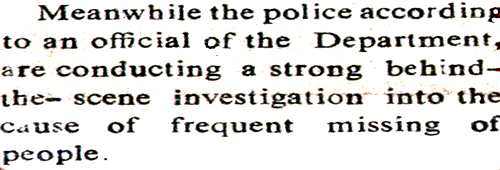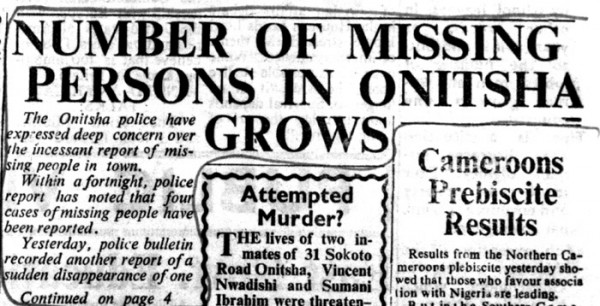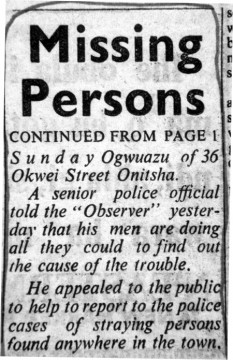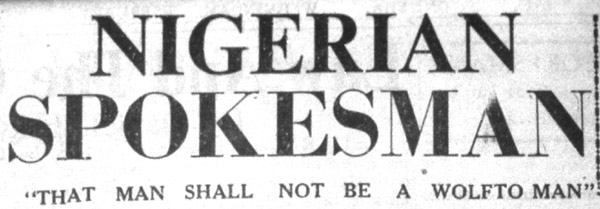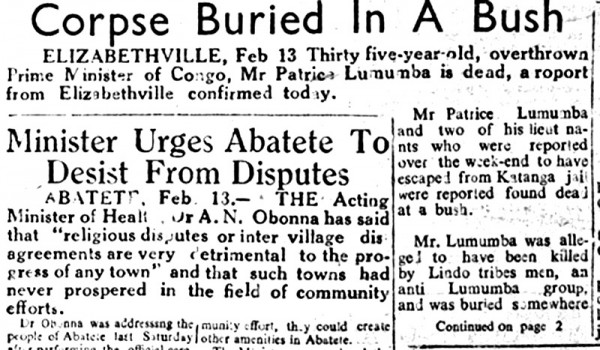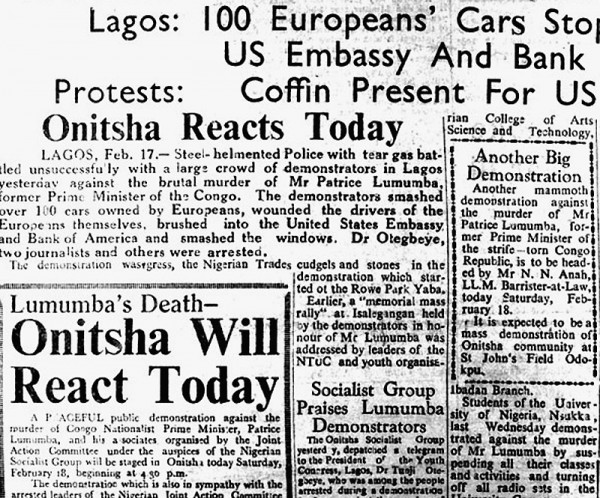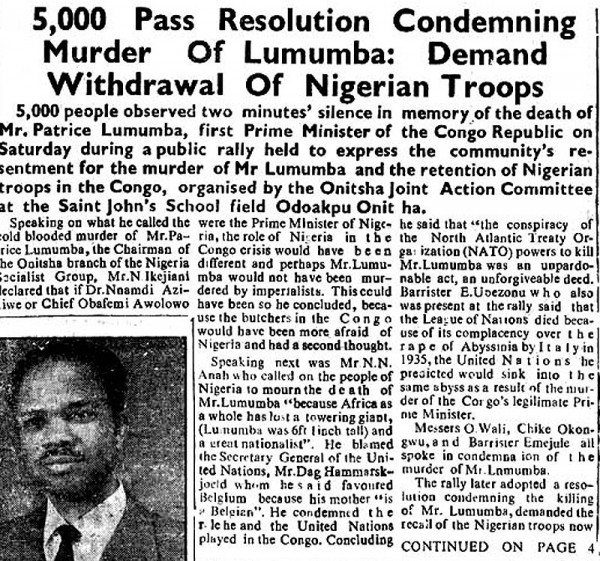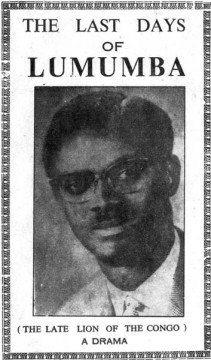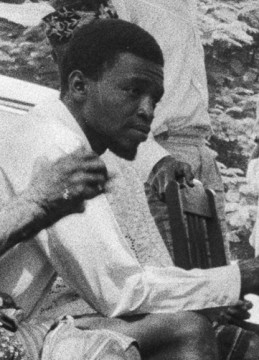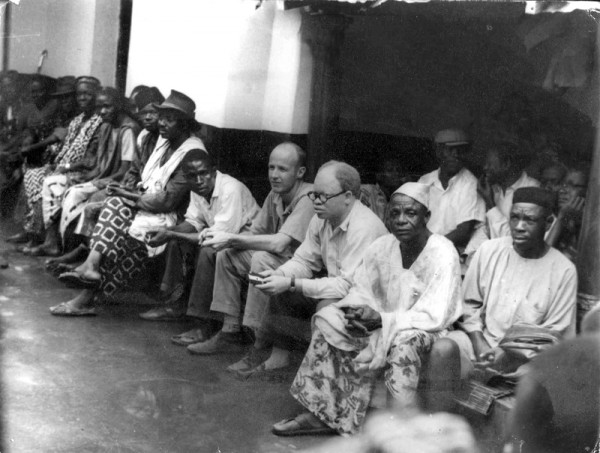(Eastern Observer article, Onitsha, February 15, 1961)
1. A second ritual secret is mooted
[Note: Click on any image you may want to enlarge.]
On February 12, 1961, I am discussing with a man of Umu-Eze-Chima (the Royal Clan), how preparations for the Obi‘sfuneral are being made. He confides to me that at this point some members of the Obi‘s family are quietly visiting the hinterlands to purchase one or more Ndi-Igbo in order to provide a human sacrifice to accompany the Obi in his burial. Flabbergasted, I protest that surely such a practice would not be seriously considered in the present day, but he insists emphatically: “I am telling you, it must be done! There must be a person to go with the Obi when he is buried. Some Onye-Igbo (“Igbo person”) will be found, either here or in the bush — someone must die with the king.”
I pursues the prospect with him, expressing doubt that Onitsha police would allow the act to occur, but he is adamant: there is no way the police could effectively prevent it, he says. The sacrifice need not be made (as in precolonial times) during the moments immediately prior to interring the corpse, nor necessarily in exactly the same place. “The details of Onitsha custom may be adjusted to meet changing circumstances”, he concludes.
We soon learn that rumors about a prospective human sacrifice are circulating as well, and extensively, among the Ndi-Igbo populace living in Onitsha Waterside. When, a few nights later, the electricity supply is suddenly interrupted in a section of the Waterside (a very rare occurrence in 1961), noisy panic erupts: many of the Igbo inhabitants assume that Ndi-Onicha, who control many of the top positions in the local utility service, have deliberately shut off the lights to facilitate their seizure of prospective victims. 1
Beginning at the same time, repeated front-paging of Missing persons articles begin to appear in the Eastern Observer, suggesting that its Action Group editors aim to intensify Ndi-Igbo anxieties arising from such rumors. A series of similar headlines appear in the Observer (but only one in the Spokesman) during the month of official silence which follow the Obi‘s death. For example, on February 15 the Observer prints this front page story:
On this date, a fortnight is almost exactly the number of days which have elapsed since the Obi’s death. This reference, plus the assumption of a unitary “cause” connecting the several (“incessant”) events, suggests that the article is pointing a finger toward the same prospective event whose truth value is now also disturbing Helen and me.
2. Moral dilemmas stun naîve investigators
From Helen’s and my point of view as visitors in Onitsha town, our situation suddenly becomes disturbingly more complex than it has previously seemed. A serious value dilemma confronts us as self-identifying members of modern (Western) civil society: if we assume that the statements made by my consultant about the collective intention to sacrifice a human being to the Obi-Onicna is true, then if we should fail to speak out to agents of the Police or the Federal Government, we will in effect be condoning the slaughter of some innocent person and will in some sense become culpable, accomplices in the crime. On the other hand, if the statement is false — a rumor being spread for some unknown purpose but without factual basis and we do make a report to higher authorities, we will both appear to hold the foolishly credulous and literalist perceptions of native customs long attributed to missionaries and other naive Europeans, and will also seem to Ndi-Onicha to be acting as spies (a possibility which, as we later become more fully aware, some local people anyway already suspect).
When I look at the 1961 reasoning in this previous paragraph, the naîvete of it seems shocking after some 60 years of subsequent experience, including reading such works as the one by Primo Levi:2
Anyone who today reads (or writes) the history of the Lager (Nazi holocaust “camps”) reveals the tendency, indeed the need, to separate evil from good, to be able to take sides, to emulate Christ’s gesture on Judgment Day: here, the righteous, over there the reprobates. The young above all demand clarity, a sharp cut; their experience of the world being meager, they do not like ambiguity.”
Indeed, that is how we talked about it at the time, assuming our primary identities as “citizens” of a “Free World” social order in which we could operate. At the time, I pursue my explorations of this subject covertly, in the context of questioning Onitsha chiefs and members of the Royal Clan about the current funerary preparations, as the day of the Announcement and the Obi‘s funeral Emergence approached. On two different occasions my consultants bring out copies of C.K. Meek’s anthropological treatise, based on his brief study of the traditional Onitsha polity in 1930-31, from which they quote passages stating that in precolonial times the Onitsha royal family was obliged to sacrifice three human beings on the day of the King’s funeral. 3 My consultants then add that since the coming of the Colonial power, Ndi-Onicha have substituted three cows for these purposes, sacrificing the animals and dividing the carcasses among all Onitsha people on the day of the Obi‘s final Emergence ritual. They assure me I will be invited to witness these rituals at the appropriate time.
As we struggle to comprehend our initial experience of this process, we wonder first about the meaning of the fiction of gradual dying and its associated requirements of secrecy, second about the meaning of human sacrifice, and third about the meaning of “Ndi-Igbo” in relation to these patterns. Our understanding of each of these aspects develops slowly along with our grasp of the meaning of kingship itself, and indeed has evolved over many subsequent years (accompanied by varying degrees of continuing uncertainties).
We find rather obvious anthropological-functionalist perspectives useful in our early efforts at interpretation. From our reading and interviews with various Onitsha authorities on the subject of kingship, it is clear that the Obi‘s traditional ritual involvement in cosmic forces implies that his death will generate severe cognitive and social disruption among Ndi-Onicha. From our early observation of Onitsha funerals we can infer that the traditional social fiction of “illness” serve as a means of focusing community attention on a required complex sequence of procedural steps, thus providing all involved parties time to organize themselves to deal with a suddenly altered social situation (or as anthropologist Victor Turner clarified the point, to transform a sudden event into an organized process of transition, within which both personal and social meanings might be sequentially elaborated in a coherently organized way) 4
In the deaths of ordinary people as well as great leaders, the doctrine of preliminary illness and related patterns of secrecy tend to direct discussion of the meaning of death into contexts controlled by presumptively responsible elders, people occupying institutional positions of authority, and to spread out the time dimensions of decision-making and action, thus enabling people to calm themselves, alleviate uncertainty in an intrinsically anxiety producing situation, clarify the dimensions of the social context as specified by those elders, and enforce some definite patterns of solidarity within the groups most directly concerned, and direct cooperation among them.
Ritual secrecy and fictions become especially important after the death of a prominent person because of the complex social perturbations such a demise sets in motion (including problems of succession and inheritance which may be very wide ranging). In this kind of context, such procedures control the spread of information while varying kinds and degrees of initiative are sequentially allocated to different sectors of the community, while expressing closure of certain social groups in opposition to “outsiders.”
In the case of the Obi of Onitsha (and to certain other pivotal Onitsha leaders as well), expanded ritual structures extend those consequences to organizing (and re-organizing) the entire traditional community in its wider inter- societal context, a process which in earlier times occurred over the space of at least a month and (on at least one occasion) as many as nine months. So the meaning of the death of particular persons varies with their symbolic significance for different ranges of social groups, and in 1961 the Obi‘s significance is believed (by most Ndi-Onicha, at least) to spread through the whole of Nigeria and even beyond (indeed, in its widest traditional imagery, it is held to be cosmological).
All of this interpretation accords with my own social structure and function perspective on African kingdoms, predicated on the classical functionalism of Fortes and Evans Pritchard’s African Political Systems, which regards an African ruler as “the axis of [his people’s] political relations, the symbol of their unity and exclusiveness, and the embodiment of their essential values” (mystical values referring to “fertility, health, prosperity, peace, justice to everything, in short, which gives life and happiness to a people”), a figure whose ritual functions serve as a “balancing constraint” and a “sanction against the abuse of political power”. 5
However, while my own research has led me to extend this kind of interpretation, I now also begin to find it emotionally unsatisfactory in light of the prospect that the forthcoming ritual processes associated with kingship might include the actual, real-time-and-place killing of one human being to celebrate the death of another. While “mystical values” of kingship are greatly appealing in abstract-theorizing contexts of social anthropology, real dying of someone innocent of any misdeeds yet by the hand of others (in my American categories, murder) now lends the term “mystical” some very disturbing overtones (in light of my own internalized Enlightenment-oriented value standards).
In this sense, the differing positions taken by the two local newspapers (each a representative of the two major competing southern Nigerian political parties) seems to correspond to previously implicit ideological evaluations of my own. The Nigerian Spokesman, NCNC-supporting organ of “Zik”, who has stood during the Independence struggle as a symbol of the values of contemporary social science and the goals of democracy (the Spokesman‘s identifying motto is Zik’s own signature affirmation, emblazoned on its front-page banner:
That this newspaper now seemingly adopts a stance of closure or cover-up, upholding hidden and possibly murderous “traditions”, while the Observer (organ of the Action Group, stereotyped by its NCNC opponents as a “tribalistic” agent of Yoruba ethnic dominance) declares itself on the side of openness, of universal humanity, of “modernity”, begins to seem ironic to me.
3. Alternative Interpretations are available.
In 1961, this verbalized prospect of human sacrifice now casts a stark shadow over our research partly because we tend at first to assume that its truth or falsity can be definitely grasped. But gradually we gather that the matter is much more complex, as our discussions of the prospective sacrifice lead us to understand that (as my initial informant had stated) there is no way we or any other person outside of the direct ritual context (or for that matter, other contexts partly or entirely unknowable) can know for certain whether such an act is “really” performed. Royal burial rituals may be witnessed only by elders of the Obi‘s immediate lineage and of the Ogboli-Olosi, (the Village of Oli Olosi, a related royal group), and should police officials insist on attending these rituals, traditional procedures might be altered sufficiently that specific acts could avoid their gaze and yet still sustain the spirit of established tradition: a human being chosen to accompany the Obi to the Land of the Dead need not be dispatched in the presence of the Onitsha police, or of any outsider, but might be killed at some other time and/or place. Under such circumstances, how might truth or falsity become definitively known?
From another perspective, we also slowly come to understand that as we repeatedly hear them emphasize in other contexts a highly salient proverb: “The word of Ndi-Onicha is not as it is spoken” . During our fieldwork we gradually recognize that those who arrogantly assert to us the timeless necessity (and hence contemporary relevance) of human sacrifice at the death of an Onitsha king are almost exclusively Onitsha young men. Most elders say flatly that human sacrifice is a custom of the past and that only cows (or smaller animals) will be sacrificed in contemporary times. They emphasize that by tradition (and in a variety of social situations) Onitsha youths tend to be “impetuous,” as suggested in the eminent Onitsha name Azikiwe, which means “youth excel in anger”, alluding to the fact that young men tend to speak and act impulsively, without considering consequences, while older and more seasoned men speak and act more thoughtfully, moderately, and diplomatically.
My research assistant Ifekandu Umunna, an Onye-Onicha and a sociology student at the University of Nigeria-Nsukka in 1961 6 emphasizes to me that it is traditional for Onitsha youths to engage in njakili (“empty boasts”), a teasing verbal aggression intended to arouse negative emotions in others but lacking substantive truth, and he says that Onitsha youths who receive non-Onitsha friends visiting Ndi-Onicha homes in the Inland Town during his youth there in the 1950s would often make a standard joke: “You’d better go home before nightfall, or we might use you for the burial of our King!” These words, he observes, are obviously not to be interpreted literally. (An anthropologist would say they signal a “joking relationship”, i.e. one signaling a combining of opposition and co-mingling.)
Outsiders becoming (very marginal) insiders to Ndi-Onicha (like ourselves, or like Ndi-Igbo friends of them) might well expect to become objects of this kind of boasting, intended to instill a respectful awareness of the awesome implications of historical Onitsha Kingship and to probe the receptivity of the newcomer to accepting life within a domain possessing such royal power. An analogous form of standardized threat behavior is traditionally made toward Onitsha boys undergoing initiation into the men’s cult of the Incarnate Ghosts (mmanwu), by those who have already been initiated: the boys are told they will travel to the Land of the Dead, where they will be torn to pieces by monstrous ancestors. Then (but only if they behave appropriately, and only perhaps) the ancestral spider will sew them back together and return them in good health to this world. To the extent that the boys accept this frightening story, express appropriate fear, and still volunteer to submit themselves to the situation, they gain later admittance into a domain of shared secret social power. Thus attaining access to male adulthood means accepting the prospect of experiencing real horror without revealing to outsiders its ultimate truth, a ritual process which has the potential to enable self-transformation. 7
Retrospectively in some sense Helen and I respond in a way analogous to this kind of social imperative when we decide that since it is not feasible for us to learn the “truth” of what might or might not happen during or near the time of the King’s burial, and since the behaviors of elders we know best show no furtiveness on the subject, we will proceed on the assumption that what the elders say is true and will press people no further with questioning about the putative sacrifice. By doing so, we probably make ourselves appear much more trustworthy to Ndi-Onicha who work with us, make it evident to them at any rate that we do not intend to act as spies, and in fact after the King’s funeral we are generally very well accepted by many if not most Ndi-Onicha as provisional members of the community during the many months to come.
However, the experience also shatters some of our initial states of naîvete, in particular our unexamined assumption that British-derived civil ethics, formally established by law in Onitsha town (and whose local government agents — though widely criticized in both European and African circles as very “corrupt” — have received us in their modernistic homes and engaged us in serious discussions of various facets of modernity) take primacy over non Western values and “customs” we have presumed are largely non-political in contemporary import. Indigenous customs we have strongly embraced, regarding them in effect as a kind of “play”, we evidently do not necessarily understand. Our initial naivete, like that of the youths described by Primo Levi in the passage quoted above, is replaced by a growing (if poorly articulated and only dimly grasped) sense of living within serious moral contradictions, which we try to negotiate (but with a nagging sense of incomplete success and a growing awareness of social distance).
The meaning of an Obi in the context of a newly independent Nigeria, with its modernistic complex of national social roles that include a President and Prime Minister, manifold arrays of government bureaucrats, and multiple legislatures, is clearly more complicated than what had initially appeared to us to be a status as a minor but picturesque icon of “the past”. For some people it appears to mean much more, that another way of living may be active. That some of these meanings cluster around the killing of others in order to make important symbolic points, that the Obiship has dimensions that may be in some senses beyond the relevance of Western law, makes research on the subject deeply troubling, the more so as we feel ourselves now socially implicated in the process.
4. Real murders, a more distant stage: February 14, 1961
In the midst of what we see as our now troubling research into the King’s death and prospective funeral, both local and national Nigerian newspapers report very shocking news under a series of banners:
HORROR! MURDER!
LUMUMBA IS DEAD
REPORT SAYS HE’S KILLED
Here we learn that in the newly-independent Congo Republic, Patrice Lumumba, its first Prime Minister, has been killed in Katanga Province, where he had been jailed under the auspices of the United Nations following his ouster and replacement in office by President Joseph Kasavubu, Premier Moise Tshombe, and General Seseke Mobutu (figures today largely forgotten on the world stage, but who at that time carriy much emotional meaning in Onitsha, as we are soon to learn). 8
The story carried by local Onitsha news agencies is that Lumumba and two of his associates have been shot by police as they tried to escape from their jail in a vehicle that had somehow (and conveniently) become available at the site. On February 14 and 15, both the Nigerian Spokesman and Eastern Observer print a press release by the Onitsha branch of the Socialist Group, which condemns the actions as murders committed by these “Congo criminals” and “their fellow international conspirators”, demands an “immediate arrest and trial by an international court of Kasavubu, Tshombe, and their collaborators”, and calls for the resignation of UN Secretary General Dag Hammarskjoeld. The Nigeria Socialist Convention affirms that
“…the United Nations which was called into the Congo by Patrice Lumumba connived at his dethronement, arrest, imprisonment and torture by imperialist agents and thereby paved the way for another addition to the record of unforgivable crimes perpetrated by colonial powers against defenceless Africans.”
On February 16 the Spokesman publishesd an article by the Nigerian (and Onye-Igbo) socialist intellectual Mokwugo Okoye attacking the Colonial Powers, whom he characterizes as “…assassins and hypocrites (who) support only those regimes in Africa which are amenable to imperialist interests”, and states that
“A time has come for all African States to withdraw their troops from the United Nations Command in the Congo under whose aegis such a mean, cruel act as the murder of democratically elected leaders of people can take place…. What is needed is an African Summit Conference whose object will be to formulate plans for the complete liquidation of Colonialism in all parts of Africa before it does more harm to the African people.”
Nigerian troops are, at the time, a significant contingent of the United Nations “peacekeeping forces” in the Congo, and — unlike ourselves — many educated Onitsha citizens have been tracking their operation with ongoing and in some cases worried concern.
On February 18, both Onitsha newspapers announce a demonstration to be held in Onitsha. The Spokesman headlines:
LUMUMBA: REACTION
The articles report smashing of Europeans’ cars in Lagos during massive demonstrations, window-breaking at the United States Embassy Library and the Bank of America there, and a procession through the Lagos Streets carrying a wooden coffin painted black and white and carrying signs such as “Tshombe and Kasavubu to the Gallows” . In Onitsha, an announcement of a public demonstration to be held in the afternoon, under the auspices of the Nigerian Socialist Group led by Barrister Luke Emejulu (a prominent Onye-Onicha), include an appeal for “peaceful behavior.”
Helen and I are quite unprepared for this news and the intensity of reactions to it in Onitsha. While we are casually familiar with the international context of the time (Time Magazine for example is available here) , it has seemed remote to us. Hearing of the imminent demonstration, we now feel that as U.S. citizens we may well become objects of this wrath, and must therefore remain in our house throughout the day. In the early evening we hear the sounds of a chanting crowd as it moves uphill from the Waterside toward the Inland Town, and we even worry that a portion of the group might even enter the Inland Town to accost us as the only Americans we know currently living in Onitsha 9 But the marchers are in fact headed toward the “European Quarter” and its Government buildings, where they deliver a petition to the Provincial Commissioners.
The Eastern Observer reports the latter portion of event on February 20 (and manages to insert a sharp criticism of Nigeria’s current Prime Minister as well), under the banner headline :
The “5,000 people” reported in the Eastern Observer assemble at St. John’s School Field in the Odoakpu section of the Waterside, where Barristers N. Ikejiani (a native of Nri), Luke Emejulu and university lecturer Obi Wali (from Ikwerre in the Niger Delta) are included in number of speakers who addressed the crowd. Since we have previously had courteous social contacts with all three of these men at local-elite parties or as guests in our house, we worry now about how we as Americans will be regarded by people throughout the town.
Our Onitsha friends, however, later report to us that the crowd was considerably smaller than the Observer reported (one estimated it as a few hundred people at most, another even fewer), and that we have nothing to fear in emerging from our 24 Mba Road retreat in Enu-Onicha. So I begin to drive about the city in my usual way, but a definite change has now occurred in Onitsha Township: many more pedestrians now regard me with open anger. The thriving industry of Onitsha market literature begins producing an array of pamphlets, for example the play published by Thomas Iguh illustrated at left.
We soon observe a plethora of young men about town whose sartorial styles resemble those of the late Patrice Lumumba, for example this youth at right, an Onye-Onicha attending one of the Interregnum rituals (discussed below). In our immediate social world, some changes in attitude are not subtle: now, when on several occasions as I drive down Francis Street in the Waterside, a large man bursts out of his house running toward my car waving his arms at me and shouting loudly, “Tshombe! Tshombe! Tshombe! Tshombe!…”10 My whole body rigidifies, hair rising on the back of my neck, and I hunch down and drive on as expeditiously as possible without looking back. Soon I avoid Francis Street altogether, and for a time I dread doing what I must as an ethnographer impel myself to do: go out from our house and navigate the streets of Onitsha (however modestly protected I might feel within the glass and metal shell of our tiny “motu machis“, the tin match-box).
At home, Helen and I come together against what we experience as baleful outside forces, as what had begun as an emotionally rich process of extremely interesting, often exciting fieldwork, where we had felt increasingly secure in our roles as outsiders, now seems suddenly, ominously changed (though established Onitsha friends continue to support us). Strong emotions — substantial fear (a previous sense of naked vulnerability intensified), a measure of horror (at both local and international events, including as the year wears on such other neo-colonial events as French atomic bomb testing in the Sahara; “FRANCE IN HELL FIRE” runs one headline) — register in my own behavior mainly as persistently heightened muscular tension (I clenched my hands and teeth unconsciously much of the time, witness the photograph below, taken during a later Interregnum ritual in the Inland Town, where I appear calm and relaxed unless you look closely at my hands).
In our view, we experience a certain measure of righteous anger: we did not assassinate Lumumba, had not even wanted his death, why blame us? We are not studying the subject of international politics here, but are (as we see it at the time) doing local people a good turn by researching people’s culture history! And why blame the United States and the United Nations, who are trying to bring order into the evidently chaotic Congo! I see no connection of any kind between these unfortunate events in the former Belgian Congo (where a killing has been done to entrench the power of Moise Tshombe and his collegues) and my own current field research in Onitsha (which happens at this point to be revolving around the subject of death and prospective acts of killing in support of figures of Onitsha royal authority). Why do so many people on the streets of Onitsha insist on making a connection between us (students of culture history, sympathetic to Africa and Africans and separated as Americans from the European colonial heritage) and the dubious actions of an array of Congo politicians fighting over national power? Some people we meet are implying we are spies.
And Early in 1962, I actually receive in the mail a postcard with the imprint of the U.S. State Department prominently displayed, and which solicits information we might have concerning local and regional conditions. I respond, not to them but to my research sponsors (the Ford Foundation), requesting they urge the State Department to desist. However, despite such indicators of U.S. Federal interests in our area, I remain self-identified with the United States, viewing its government as largely benign (not an unusual view I daresay for one whose winning of National Science Foundation Fellowships has enabled me to pursue postgraduate education this far!).
Some years would have to pass before we better grasp the politics of the Congo in relation to United States national interests, of Ndi-Onicha in relation to Ndi-Igbo, and more broadly the issue of how far citizens may be fairly judged responsible for the actions of their governments. Perhaps the most serious implications of these two problematic situations (local and international) are: What long-term consequences might accrue from present behaviors, as they come to be understood by those standing outside the immediate situations?
5. Social distances and death
Looking back at this situation over a time-gap of many years, we see that both Helen and I responded to these sudden blows to our emotional and moral naivete primarily by increasing the emotional and moral distance between ourselves and the people among whom we were living. In my own subsequent fieldwork, while I more or less continued to behave in my previous version of the “American friendly” manner, I encapsulated myself emotionally, and acted more and more like a passive camera, observing and recording but for the most part not confronting or challenging Onitsha people in relation to the current moral dimensions of their (or my) behavior. When they overtly denigrated the United States of America (or “European colonialists”, I usually did not strongly engage the remarks (whether I agreed with them or not), partly because I felt in some sense paralyzed by my own slow-growing ambivalence toward U.S. international policies, partly because I myself now began to objectify the speakers as ideological “others”. A kind of emotional “dissociation” returned, enabling me to continue the research, but at the expense of the moral growth that might have emerged from more actively confronting people and pursuing the problems of ethics of such domains as “human sacrifice” (whether “traditional” — conducted in a locally-bounded kingdom adhering to religious traditions — or “modern” — pursued as part of the international ideologically-driven policy of a “democratic” nation-state), and my avoidance of the issues bore long-term, bitter emotional fruit in the form of private guilt, nagging suspicions and doubts, and a tendency to generalize a devaluation of these Others.
I ceased being largely open and straightforward with them, and became more cynically aware of putting on a suitably objective (and in part, ingratiating) front which concealed my emotional distancing. A kind of paranoid quality of thinking crept in, which lessened the quality of my experience .11
While I never dared ask Onitsha people what they thought of me during our first stay there in 1960-62 (feeling too vulnerable to raise such questions in those days), those few who strongly suspected the worst of us tended to make their views fairly clear (we avoided them where possible, but openly opposed them when we had to — I became somewhat more openly aggressive toward others toward the end of our stay, which was a boost in emotional health for me), while those in a position to observe us closely (as we later learned during our return to Onitsha in 1992) concluded that what we were doing appeared harmless in contemporary political terms, was potentially of considerable value for culture historical purposes (which most of them valued highly), and whatever lingering doubts they had concerning our intentions were eventually dispelled when our various publications on Onitsha began coming to light. 12 It seems likely to me that many Ndi-Onicha who knew us then were able to draw some evaluative distinctions to the effect that, while marginally-situated United States citizens could not escape some degree of moral complicity in the death of Patrice Lumumba any more than ordinary Ndi-Onicha could entirely evade the consequences of actions possibly undertaken by power-holding agents following the death of their Obi, it is quite problematic to what extent such people bear the same order of responsibility as do those who can directly make and implement such decisions (though issues of democratic responsibility are also raised for those who proclaim it as a prime value). It now seems illuminating to me that, during the same time, I was quite unable to think with such clarity on these topics myself — “guilt” for me then was an either/or matter, like Primo Levi’s youth who “above all demand clarity, a sharp cut; their experience of the world being meager, they do not like ambiguity” — and I judged Nigerians’ possible complicity in violence considerably more harshly than I judged my own.
At one heart of the matter, from some Onitsha points of view, lay an issue clearly identified by the Missionary-anthropologist G.T. Basden in 1938, when he observed concerning the culture of the “Ibo” 13:
“Native Law, in its primitive form, is inextricably bound up with life and death. When the native societies apprehended that the power to take life was, henceforth, denied them (by the British Administration), they not merely came under restraint; they virtually died. What now passes for native law and custom is but a travesty of what it was in the old days; it is but the shell; the kernel has been destroyed.”
But clearly, not all portions of “native societies” accepted the loss of this basic right of a government striving to maintain some capacities for autonomy. And viewed from the perspective of a much longer duration (some 70 years of intervening “administrations”), basic issues of autonomy must remain. In any case, at that time I turned away from direct dialogue on the question of what membership in one moral community or another “means” in relation to “modernist” or “other” values, and turned instead to the deepening ethnographic mystery more immediately amenable to my awareness: What in the patterns of relationship between Ndi-Onicha and Ndi-Igbo made so salient the mutual context of kingship and death? Why must it be an Onye-Igbo to be seized (whether only in the story or in the physical fact)? This question could absorb volumes, and we must devote some chapters to provide whatever scant photons of light we may be able to shed on it.
- Electricity interruptions, very atypical in 1961, occurred when we returned to Onitsha in 1992 on a daily basis (which Ndi-Onicha then regarded as a political device being employed by local authorities, now under substantial control by the immigrant Ndi-igbo rather than themselves). [↩]
- Primo Levi, 1989: 37. [↩]
- See Meek 1937:xii, 189. [↩]
- Turner 1967. Obviously, Malinowski’s 1955 analyses of psychological functionalism are relevant here as well. [↩]
- Fortes & Evans-Pritchard 1940:16-19. [↩]
- An Onitsha indigene from Umuaroli village, Umunna acted as one of our fieldwork assistants in Onitsha during 1961-2. He later studied sociology at Rutgers, taught at Hartford University and Edward Waters College from the late 1960s through the 1980s, and co-authored Onitsha research with us until his untimely death in December 1989. [↩]
- Turner’s now-classical analyses of transition rites (1967:93-111, 1969:94-130, 1985:249-73) apply very nicely here. [↩]
- The three named were Congolese leaders thought to be primarily responsible for Lumumba’s death. [↩]
- Actually another couple is present, but they are socially so isolated that we only learn of them much later. [↩]
- Moise Tschombe, Congolese leader of the killers of Lumumba, was the most hated figure of the Congo cabal at that time. [↩]
- An impassioned critique of these tendencies in western social scientists by Stanley Diamond (1963) later illuminated these problems for me. [↩]
- See my Tribute to Mbanefo Odu in these pages for an example of this from our visit to Onitsha in 1992. [↩]
- p. xiiii [↩]
